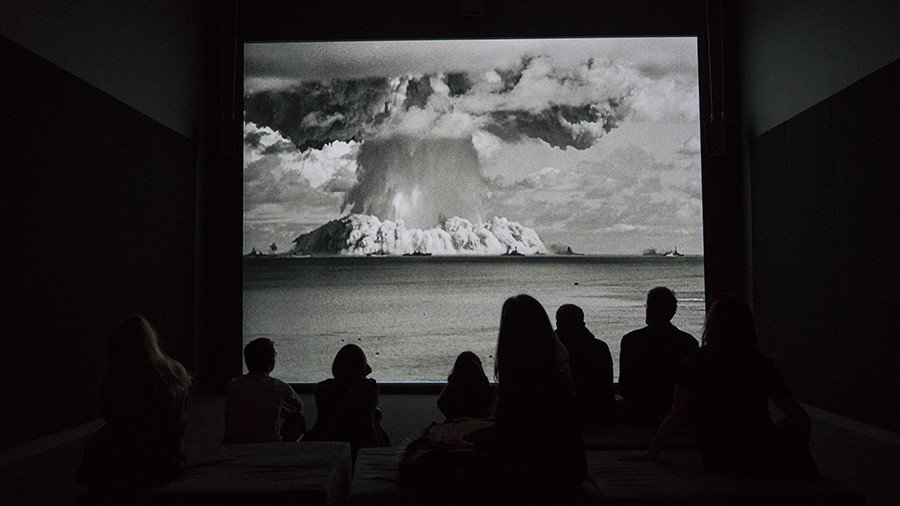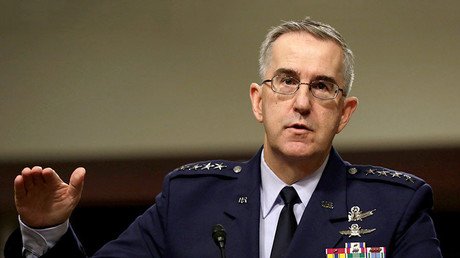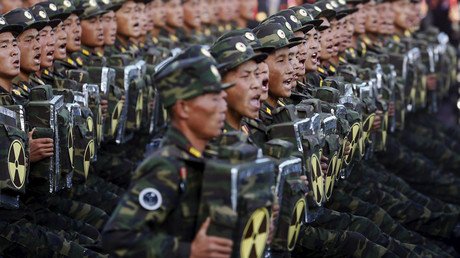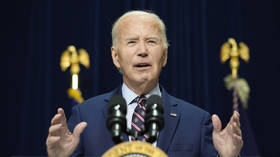BOMBastic rhetoric: Congress reminds Trump ‘no nuclear first strike without its approval’

It is a good reminder to the president and to the military that no offensive nuclear strike can be conducted without approval of the peoples’ houses, Ivan Eland, US defense analyst, told RT.
US Air Force Gen. John Hyten, head of the US Strategic Command (STRATCOM) said Saturday he would disobey any presidential order to carry out an atomic strike which he determined illegal, adding he would instead suggest other legitimate options to Donald Trump.
Speaking at the Halifax International Security Forum on Saturday, Hyten said the US military is not exactly unprepared to hear the nuclear order.
"We're not stupid people. We think about these things a lot. When you have this responsibility, how do you not think about it?" he said.
Hyten oversees the US strategic nuclear triad, consisting of long-range bombers, land-based intercontinental and submarine-launched ballistic missiles.
RT: Why is the question of illegal strikes even being raised? Is it alarming? Can this be seen as a shift in nuclear weapons rhetoric?
Ivan Eland: This is unprecedented, I think, for a general to come out and say that he would refuse an illegal order from the president.
RT: Do General John Hyten's remarks indicate there's little real threat now of a nuclear strike?
IE: I think Donald Trump has used some pretty harsh rhetoric against North Korea, for example, “fire and fury” and he threatened to use nuclear weapons against the country indirectly if they threatened the US again. So the foreign policy and defense establishment here in the United States is pushing back on that. There was a former head of this command at the Congressional hearings last week who said the same thing that the military would push back if there were an illegal order to launch nuclear weapons. And then shortly after that, the current head of the Strategic Command, which deals with nuclear weapons, said the same thing. I think we are seeing these generals and former generals pushing back and saying, “Yes, the military would push back on an illegal order. Of course, the military in our country is pledged to stick up for the Constitution - not any one leader or Congress, or even the president." If they launch nuclear weapons with an illegal order, they could be put in jail for it.
RT: The Senate is holding hearings on whether there should be checks on the president's power to order nuclear strikes, the first since 1976. Has Trump's war of words with North Korea spooked lawmakers?
IE: I think there is always some threat when the president uses such rhetoric. But … the rhetoric from both North Korea and the US has been really inflammatory. The US probably should turn down its rhetoric; you can’t do much about North Korea. But it doesn’t help when the president uses language like this. And I think it has alarmed not only US allies, but of course US foreign policy and the defense establishment as well. Congress held hearings last week for the first time in 40 years about the president’s authority to use nuclear weapons, and that hasn’t happened for a long time.
RT: Could the outcome of the Senate hearings temper Trump's rhetoric?
IE: There have been bills introduced in Congress in addition to the hearings last week that would say an offensive nuclear strike, meaning a first strike, cannot be conducted without a declaration of war by Congress. The Constitution is set up that way anyways. I think the law if passed, would reiterate this situation. I think it would probably be a useful measure, just as a reminder to the president and to the military that no offensive nuclear strike can be conducted without approval of the peoples’ houses. That is what our republic was originally set up do in the Constitution in 1787 for conventional war and the same should be done for nuclear war these days. The US Constitution is not out of date at all; it just needs to be reinforced among the military and other officials including the president.














